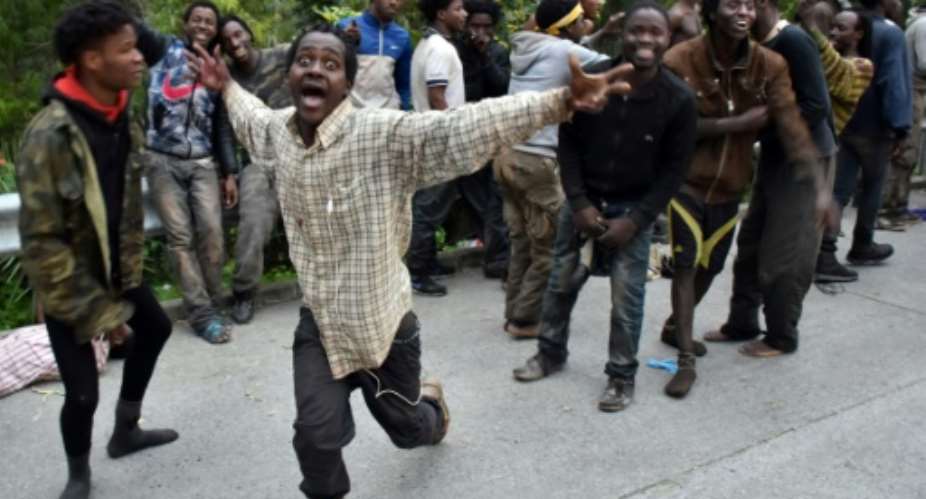Madrid (AFP) - Hundreds of migrants stormed the border between Morocco and Spain at Ceuta on Friday, days after Morocco warned the EU of fresh migrant trouble following a row over a trade deal.
Ceuta officials said 498 migrants were counted climbing over the high border fence into the Spanish North African territory. A total 700 had attempted to cross, they said.
Moroccan authorities said 250 people tried to get across, of whom 110 were detained and around 20 injured.
In Ceuta, officials said two migrants and 11 officers were hurt.
Footage shot by the local Faro de Ceuta television showed dozens of euphoric migrants wandering the streets of the seaside enclave, ecstatic to have finally crossed into a European Union state.
 Migrants flood into Spanish Ceuta
Migrants flood into Spanish Ceuta
"I love you Mamma, long live Spain," shouted one young African draped in a blue EU flag, while another shouted "Freedom, freedom!"
Ceuta and Melilla, also a Spanish territory in North Africa, have the EU's only land borders with Africa, so are entry points for migrants who either climb the border fence, swim along the coast or hide in vehicles.
Emergency services said on Twitter that 400 people were receiving assistance from the Spanish Red Cross.
Row over trade deal
The massive entry, one of the biggest since the border barrier was reinforced in 2005, comes amid a dispute between Morocco and the EU over the interpretation of a free trade farm and fishing deal.
In a late 2016 ruling, an EU court said the deal did not apply to the Western Sahara, a former Spanish colony controlled by Rabat where the Polisario Front is fighting for independence.
 Migrants queue outside the Center for Temporary Stay of Immigrants (CETI) after forcing their way through a fence between Morocco and the tiny Spanish enclave of Ceuta on February 17, 2017.Hundreds of migrants stormed the border between Morocco and Spain at Ceuta today, days after Morocco warned the EU of fresh migrant trouble failing progress over a trade deal.
Migrants queue outside the Center for Temporary Stay of Immigrants (CETI) after forcing their way through a fence between Morocco and the tiny Spanish enclave of Ceuta on February 17, 2017.Hundreds of migrants stormed the border between Morocco and Spain at Ceuta today, days after Morocco warned the EU of fresh migrant trouble failing progress over a trade deal.
The court said this was because the status of the disputed territory remained unclear according to the international community.
The 28-nation bloc did not recognise it as part of Morocco.
The ruling opened the way for the Polisario Front and its supporters to contest trade in products from the Western Sahara between Morocco and the 28 EU states.
The decision angered Morocco, which in a warning on February 7 suggested it could lead to "a new flow of migration" towards Europe and place the continent "at risk".
The last such massive attempt took place on New Year's Day when more than 1,000 migrants tried to jump a high double fence between Morocco and Ceuta in a violent assault that saw one officer lose an eye.
 A Moroccan flag flies behind the border fence between Morocco and Spain's North African territory of Ceuta
A Moroccan flag flies behind the border fence between Morocco and Spain's North African territory of Ceuta
The enclave has been ringed by a double wire fence that is eight kilometres (five miles) long. The six-metre (20-foot) high fence also has rolls of barbed wire.





 There’s nothing you can do for us; just give us electricity to save our collapsi...
There’s nothing you can do for us; just give us electricity to save our collapsi...
 Ghanaian media failing in watchdog duties — Sulemana Braimah
Ghanaian media failing in watchdog duties — Sulemana Braimah
 On any scale, Mahama can't match Bawumia — NPP Youth Organiser
On any scale, Mahama can't match Bawumia — NPP Youth Organiser
 Never tag me as an NPP pastor; I'm 'pained' the 'Akyem Mafia' are still in charg...
Never tag me as an NPP pastor; I'm 'pained' the 'Akyem Mafia' are still in charg...
 Your refusal to dedicate a project to Atta Mills means you never loved him — Kok...
Your refusal to dedicate a project to Atta Mills means you never loved him — Kok...
 2024 elections: I'm competent, not just a dreamer; vote for me — Alan
2024 elections: I'm competent, not just a dreamer; vote for me — Alan
 2024 elections: Forget NPP, NDC; I've the Holy Spirit backing me and nothing wil...
2024 elections: Forget NPP, NDC; I've the Holy Spirit backing me and nothing wil...
 2024 elections: We've no trust in judiciary; we'll ensure ballots are well secur...
2024 elections: We've no trust in judiciary; we'll ensure ballots are well secur...
 Performance tracker: Fire MCEs, DCEs who document Mahama's projects; they're not...
Performance tracker: Fire MCEs, DCEs who document Mahama's projects; they're not...
 Train crash: Railway ministry shares footage of incident
Train crash: Railway ministry shares footage of incident
